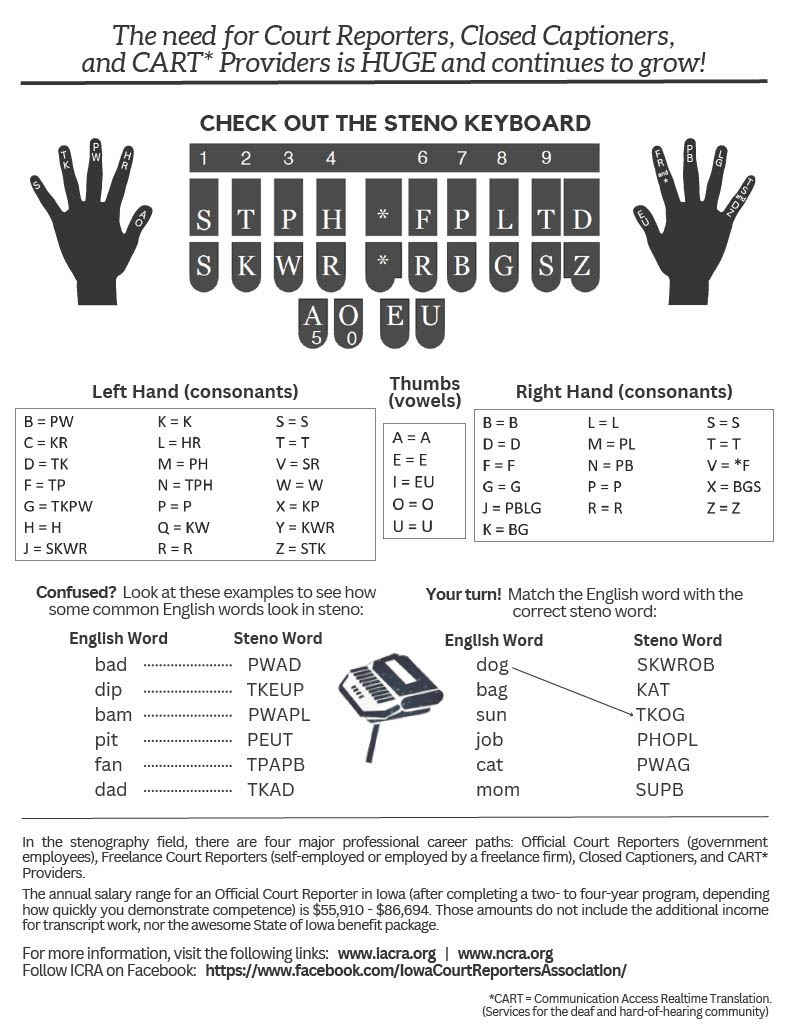IOWA COURT REPORTERS ASSOCIATION |
- Home
- Learn More
Are you interested in learning more about court reporting or captioning? Below are some resources to check out!

General Information
The information in this document is specific to working as an official court reporter in Iowa, particularly for State of Iowa (District Court) positions.
Court Reporting Programs:
· There are many court reporting programs across the country.
· Program curriculums are typically between 2 to 2.5 years in duration. While short breaks between quarters, trimesters, or semesters are likely, court reporting programs do not take time off for summer break. This would interfere with the ability to gain the speed necessary to complete the program (225 wpm at 95-97 percent accuracy, sustained for five minutes).
· While many programs are fully virtual or are transitioning to a virtual setting, the programs which will offer the most success are in-person programs, hybrid programs (a mix of both in-person and virtual), or programs offering virtual programs with classes set at specific times allowing students and instructors to have real-time communication. That is not to say the self-paced online programs are impossible or insufficient. The programs simply require more dedication and self-discipline.
Recommendations for Court Reporting Programs:
DMACC
- DMACC is currently the only program in Iowa for court reporting. DMACC starts a new session each fall. As of the fall of 2022, the program can be completed nearly fully virtual, with the exception of two days at the beginning of fall semester that require in-person attendance at DMACC in Newton.
- Certain DMACC court reporting classes require virtual attendance at specific times where the entire class is online at the same time and receiving live instruction from their instructor.
- The professors at DMACC are all extremely experienced and WONDERFUL. The program has been highly rated by our National Court Reporters Association
- https://www.dmacc.edu/pathways/pcs/realtime-court-reporting.html
Black Hawk College
- Located in Moline, IL.
- BHC commenced their program in the fall of 2022.
- The program is fully in person and appears to be an excellent program with wonderful instructors as well.
- https://www.bhc.edu/program/court-reporting-technology/
Anoka Technical College
- Currently a hybrid program (similar to DMACC) out of Minnesota.
- https://www.anokatech.edu/ProgramsCourses/AdminMgmt/JudicialReporting
College of Court Reporting
- An online program out of Indiana.
- A new theory course begins every five weeks, so this would be a great place if you wanted to start right away.
- http://www.ccr.edu
Cuyahoga Community College
- An online program out of Ohio.
- https://www.tri-c.edu/programs/captioning-and-court-reporting/index.html
A few personal comments regarding court reporting programs:
The court reporting program is very difficult. To some, it may come easier and more naturally, whereas, to others, it can be extremely challenging and require much more practice. Often writing (what we call “typing” on our writer) comes easier for talented gamers, quick typists, pianists, or other musicians who play instruments with their hands. Writing on a writer is similar to playing a piano, as you hit multiple keys at one time.
Court reporting programs are streamlined to focus on what you NEED for this career. The bulk of schooling focuses on theory and speed classes; however, medical language, legal courses, grammar and punctuation classes, internships, and CAT (computer-aided translation) software education are included and important components of the programs. The grammar and punctuation courses for court reporting are different than standard English-Literature courses, as you are learning to edit and punctuate the way people talk and not the way one would write a book.
Court reporting programs begin by learning where the keys are on the keyboard. Different combinations of keys make different letters. Along with the familiarization of the keyboard comes the theory of writing (different key combinations make different sound beginnings and endings).
Upon completion of theory, the primary focus shifts to speed building. Speed-building courses top out at 225 wpm sustained for five minutes with 95 or 97 percent accuracy.
Some credits from prior college education may transfer, but likely very few as almost every class in the court reporting program is specifically tailored to the court reporting field.
Requirements to Work as an Official Court Reporter in Iowa:
- Graduation/completion of a court reporting program AND
- Certification as a Certified Shorthand Reporter (CSR) by the Iowa Board of Shorthand Reporters.
Steno A to Z Program is a free 6-week online course that introduces you to the machine and how it works. It's a great way to gauge your interest in determining whether you want to pursue further education in the program.
Courses are offered frequently, so check out https://www.ncra.org/discoversteno to find the one that works best for you!
